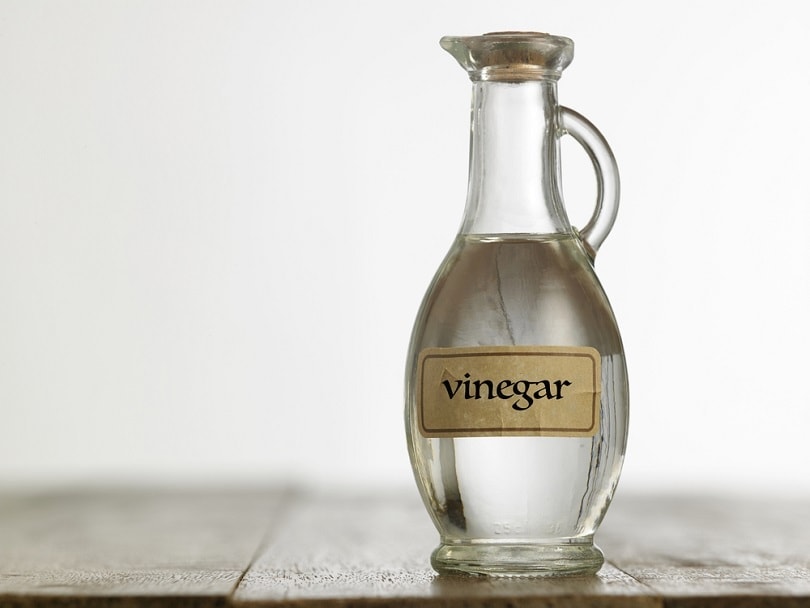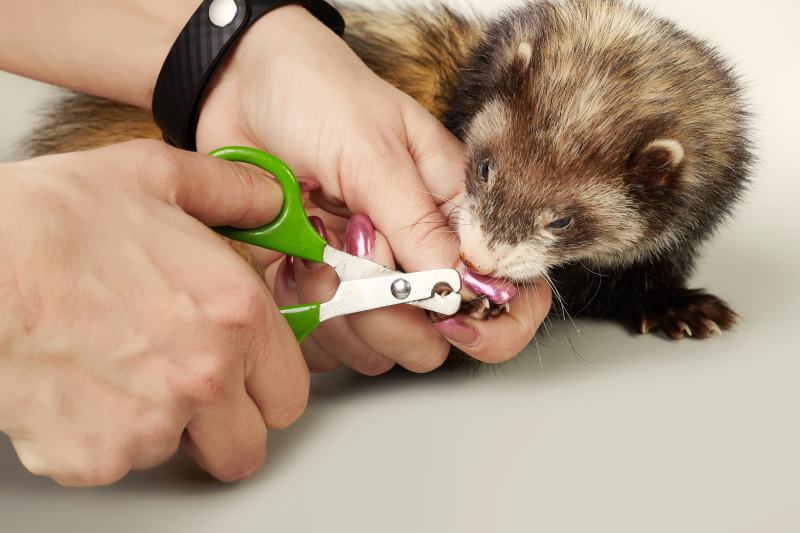VET APPROVED

The information is current and up-to-date in accordance with the latest veterinarian research.
Learn more »Click to Skip Ahead
Fleas are incredibly annoying! When you spot that telltale flea dirt or watch your pet vigorously scratching themselves, you know that it’s going to take a while to get rid of these pests. It would be nice if you could eliminate them with a natural remedy, so does vinegar work on fleas?
The short answer is no, vinegar does not kill fleas and will not remove them from your home, but it can function as a repellent of sorts.
Here, we discuss what effect vinegar has on fleas and your options for when these stubborn pests don’t seem to want to go anywhere.

Does Vinegar Work to Remove Fleas From Your Pet?
While vinegar has its benefits, particularly apple cider vinegar, it can’t be used to kill fleas on your pet and in your home. Many people will tell you that it can be effective for killing fleas, but there’s no evidence that this is true.
The problem with fleas is that you can’t just kill the adult fleas; you need to eradicate the eggs and larvae too. Vinegar is just not strong enough to penetrate the shells of flea eggs or larvae.
Fleas don’t like the taste or smell of vinegar, so if you spray your pet with it, they might jump off, but this is not advisable. Vinegar is acidic and is likely to irritate and dry your pet’s coat, and it doesn’t solve the overall flea problem in your home.
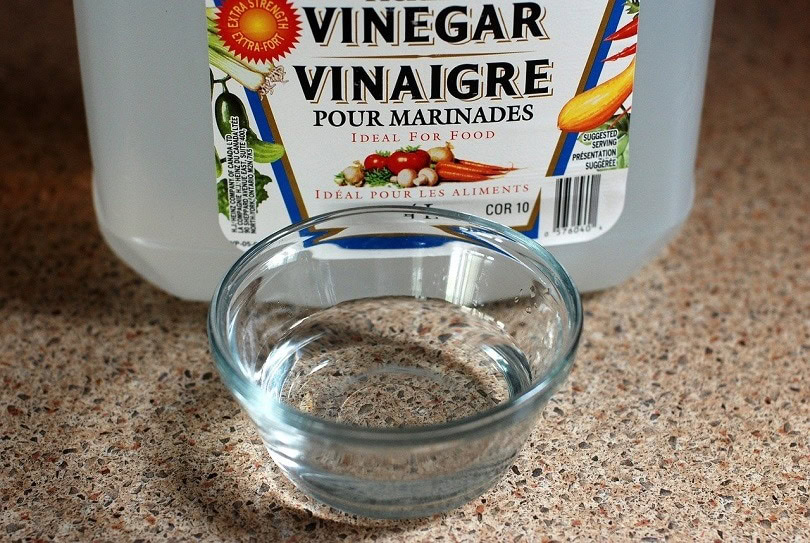
Can Apple Cider Vinegar Be Safely Ingested by Pets?
You shouldn’t give apple cider vinegar to your pet unless your vet gives you instructions on how to safely do so under their supervision. Vinegar is quite acidic and can damage the lining of the esophagus and stomach, as well as tooth enamel. This can eventually lead to vomiting and stomach ulcers.
No matter what you might have heard, an animal drinking small amounts of vinegar will not keep fleas away from them. Always speak to your vet before giving your pet anything as a method to eradicate fleas.

What’s the Best Ways to Get Rid of Fleas?
The first thing that you should know is the lifecycle of fleas, which should give you a better idea of the best ways to get rid of them.
Flea Life Cycle
Adult fleas attach themselves to an animal, like your pet, for a blood meal, which helps them lay fertile eggs. Female fleas can lay about 40 to 50 eggs every day!
These eggs fall off your pet and drop to the carpet and animal’s bedding, eventually developing into larvae and then pupae. A pupa is protected by a cocoon and will lie dormant until it emerges as an adult flea by light, vibration, heat, or exhaled carbon dioxide. The whole cycle then begins anew.
The cocoons can lie dormant for months before hatching when the conditions are right. So, you will not be rid of fleas by dousing your pet with vinegar.
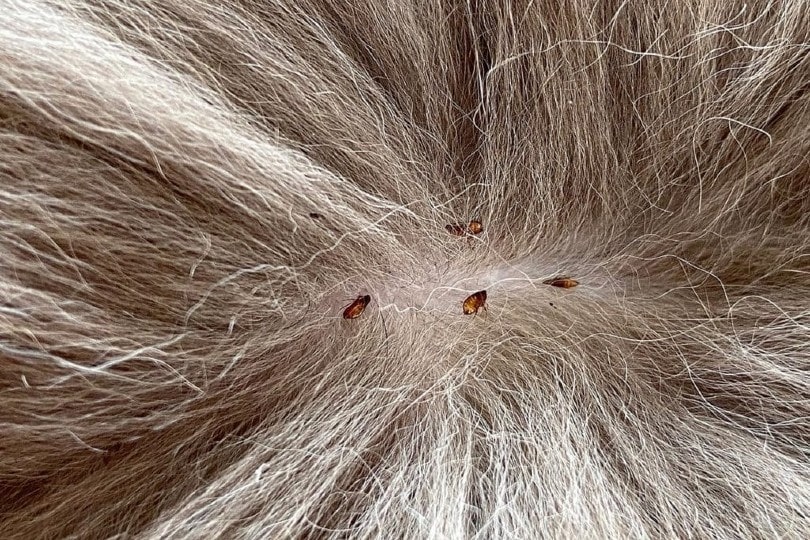
Removing Fleas From Your Pet
If your pet currently has fleas, start by speaking with your veterinarian to determine your next steps and the products that they recommend.
Using a flea comb on your pet can be a simple first step. Have a bowl with hot soapy water nearby, and place any fleas and eggs that you find in the water, which will kill them.
Following this, speak to your vet for the most appropriate flea treatment and preventative for your pet. These can be in the form of topical spot-on products or tablets. It is important to note that many dog flea products can be highly toxic to cats and must never be used on cats. Always follow your veterinarian’s advice.
Removing Fleas From Your Carpet
Next, you will need to treat your home. Flea pupae can stay dormant for months and will hatch under the right circumstances (like your pet sitting on top of them).
This step requires a great deal of vacuuming! Vacuum everything thoroughly, and when you’re done, take the container outside and empty it or dispose of the bag. Don’t bring the bag back inside the house.
Continue with this procedure until you feel confident that you’ve removed all evidence of fleas and their eggs and pupae. You can also use a vet-approved household flea spray. Always follow the instructions carefully.
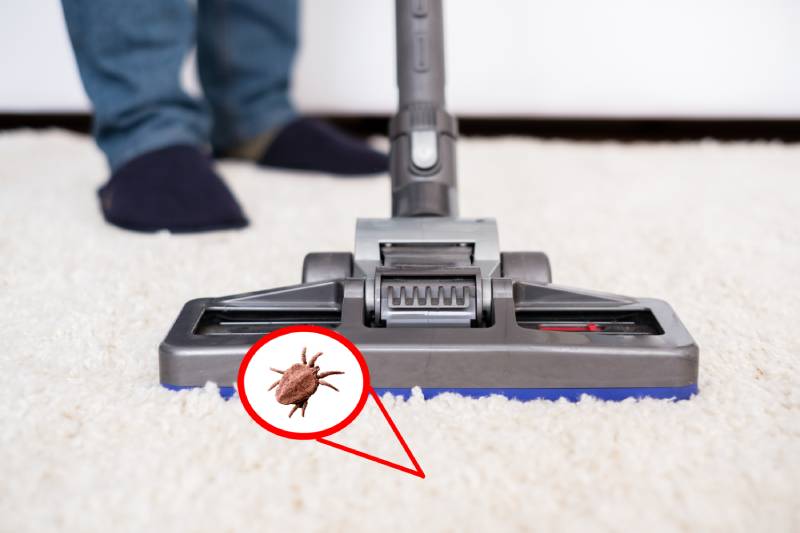
Removing Fleas From Bedding
Now you need to wash everything that’s washable on the hot cycle of your washing machine and dryer. Throw your sheets, duvet covers, pillowcases, and your pet’s bedding into the machine, and run them through with hot water.
Removing Fleas From Your Yard
This step is only necessary for homes with yards and pets that spend time in them. If you have an indoor-only cat, this might not be necessary unless your yard is the only way that the fleas get inside.
Fleas seek out moist places, so you’ll want to avoid overwatering your lawn and remove anything where water will gather, like leaf piles and grass clippings. You can add cedar chips around any shrubs and plants or along pathways, as fleas have an aversion to these. You can also try sprinkling diatomaceous earth.
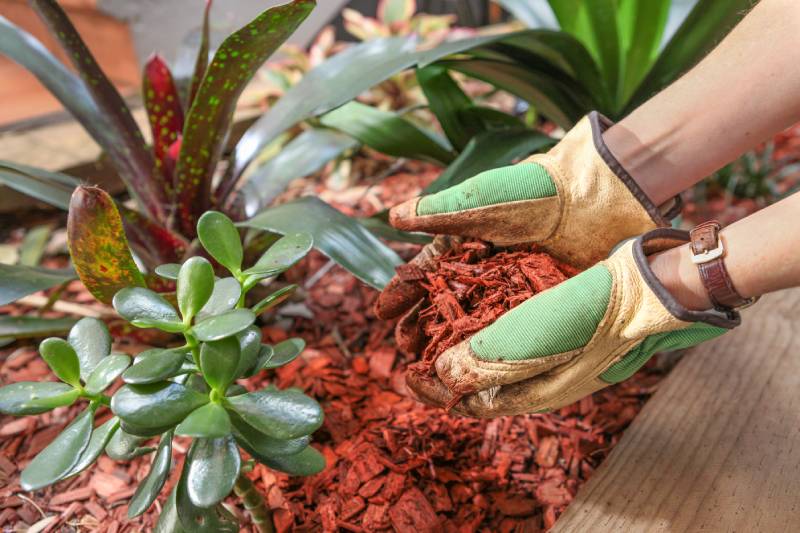

Flea Prevention Is Key
Whether you’ve had flea infestations or not, prevention is essential. It’s best to treat your animals rather than wait for the fleas to invade.
You should consult your vet to find the right product for your pet. Most topical treatments require squirting a small vial of the product between your pet’s shoulder blades. There’s also oral medication. Either method usually requires application or treatment once a month, but always follow the dosage instructions carefully as some need to be administered less frequently.

Conclusion
Fleas are serious business and not just a nuisance. They can lead to pain and discomfort for your pet, and they can carry diseases like cat scratch fever and other parasites like tapeworms. But not all home remedies, such as vinegar, are capable of eradicating parasites like fleas.
You should always rely on your vet for the proper prevention and treatment information, especially since fleas can be quite a challenge to get rid of. The longer it takes to remove them from your pet and home, the more there will be. Your top priority is your pet’s comfort and well-being.
Featured Image Credit: focal point, Shutterstock
